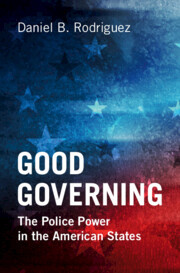Description
Good Governing
The Police Power in the American States
Author: Rodriguez Daniel B.
Language: English
Subject for Good Governing:
Publication date: 06-2024
300 p. · Hardback
300 p. · Hardback
Description
/li>Contents
/li>Biography
/li>
Good Governing: The Police Power in the American States is a deep historical and legal analysis of state police power, examining its origins in the founding period of the American public through the 20th century. The book reveals how American police power was intended to be a broad, but not unlimited, charter of regulatory governance, designed to implement key constitutional objectives and advance the general welfare. It explores police power's promise as a mechanism for implementing successful regulatory governance and tackling societal ills, while considering key structural issues like separation of powers and individual rights. This insightful book will shape understanding of the neglected state police power, a key part of constitutional governance in the U.S. This title is also available as Open Access on Cambridge Core.
Part I. Power for the People – Creating the Modern Police Power: 1. State Constitutions and the Governance Project; 2. The Police Power in our Republic's First Century; 3. 'The Power to Govern Men and Things': The Police Power Evolves To Meet New Conditions; 4. The Shape of the Police Power in the Modern Era; Part II. Structural Considerations: 5. Separating and Distributing Powers and Functions; 6. Constitutional Rights; 7. Turning Inside Out: Resolving Conflicts over the Scope of the Police Power; 8. The Police Power and Federalism; Part III: The Police Power's Promise; 9. Spheres of Regulatory Governance; 10. Techniques of Regulatory Intervention: New Tools to Solve Wicked Problems.
Daniel B. Rodriguez is the Harold Washington Professor of Law at Northwestern Law School. In addition to Northwestern, Professor Rodriguez has held tenured positions at the University of Texas, the University of San Diego, and the University of California, Berkeley and has held visiting positions at Harvard, Stanford, and Columbia. His scholarship focuses on public law, including constitutional law, administrative law, and regulation.
© 2024 LAVOISIER S.A.S.

